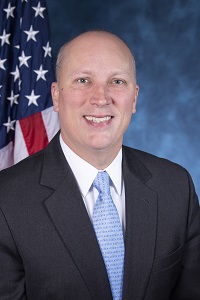Bill Flores Discusses the Latest from Washington
 I issued the following statements regarding H.R. 5430, the United States-Mexico-Canada Agreement (USMCA) Implementation Act; Nancy Pelosi’s articles of impeachment; S. 151, the Telephone Robocall Abuse Criminal Enforcement and Deterrence (TRACED) Act; S. 1790, the National Defense Authorization Act (NDAA) for FY 2020; federal government funding packages; and H.R. 3, the Lower Drug Costs Now Act:
I issued the following statements regarding H.R. 5430, the United States-Mexico-Canada Agreement (USMCA) Implementation Act; Nancy Pelosi’s articles of impeachment; S. 151, the Telephone Robocall Abuse Criminal Enforcement and Deterrence (TRACED) Act; S. 1790, the National Defense Authorization Act (NDAA) for FY 2020; federal government funding packages; and H.R. 3, the Lower Drug Costs Now Act:
USMCA
Today's vote to approve the United States-Mexico-Canada Agreement (USMCA) is a big win for America’s farmers, ranchers, workers, manufacturers and businesses. After more than a year of advocating for this important trade deal, we are finally one-step closer to modernizing and rebalancing trade relationships with our most important export markets – Mexico and Canada. The USMCA will expand agricultural trade, increase American manufacturing and protect intellectual property. It will lead to freer markets, fairer trade and robust economic growth in North America. As the major hub of North American economic activity, Texas stands to greatly benefit from this strengthened agreement as we move into a diverse 21st century economy. It is shameful that America had to wait so long for Nancy Pelosi to finally prioritize progress over politics. I urge the Senate to swiftly pass the USMCA so that it can be signed by President Trump.
Articles of Impeachment
This week, for the third time in our country’s history, the House voted on articles of impeachment of a sitting president. This process has been partisan and politically motivated from the start. I voted NO on the Democrats’ articles of impeachment. I issued a statement laying out the truth behind this sad episode in American governance, and why I made my decision to vote against impeachment. I invite you to read my full statement by CLICKING HERE.
This impeachment charade and the hyper-partisanship of the Left has kept Congress from doing the work necessary to fix the problems that hardworking American families care about most. Now that Pelosi, Schiff, Nadler, et al. have played this political stunt to its impending demise, my hope is that the People’s House can get back to doing the people’s business.
 Click on the image above to view Congressman Flores’ remarks in opposition of articles of impeachment. |
TRACED Act (Robocalls)
Hardworking Americans are frustrated and angry about the overwhelming number of intrusive and scamming robocalls they receive every day. Thankfully, the House recently put politics aside and passed a bipartisan bill to curb the onslaught of harassing robocalls. The TRACED Act puts Americans back in charge of their own phones by giving them the tools they need to stop robocalls at no extra cost. This bill strengthens provisions to go after bad actors, including my bipartisan provision to increase fines for scammers who continue to use robocalls. I look forward to President Trump signing this bill into law so that we can all once again feel secure when answering our phones.
 Click on the image above to view Congressman Flores’ remarks in support of the TRACED Act. |
NDAA
Our nation’s military works relentlessly to defend and protect America. The National Defense Authorization Act provides our military men and women with the essential resources they need to keep America safe. The House passed this bipartisan bill to increase funding to rebuild our military, make critical investments in defense systems, give our troops the largest pay raise in a decade and put an end to the unjust ‘Widow’s Tax’ on survivor benefits. Strengthening our military and defense will support our continued work to combat emerging threats and provide for the safety and security of hardworking American families.
Federal Government Funding
This week, Congress considered two legislative packages to fully fund the federal government for the remainder of Fiscal Year 2020. These packages a national security-oriented package and a non-defense/domestic oriented package. The defense related package prioritizes national security, continues to strengthen our military and provides new funding for border security. I supported the defense package, however, I voted against the non-defense package because of its excessive spending levels and deficit impact. Going forward it is imperative that Congress commit to putting our nation’s budget on a path to balance by addressing the long-term drivers of the nation’s deficits – unsustainable and ever-increasing levels of mandatory spending.
H.R. 3
Last week, Nancy Pelosi continued to push her hyper-partisan agenda as the House considered a socialist bill that implements price-controls in the prescription drug industry. Make no mistake, this bill will crush drug innovation, lead to fewer lifesaving cures and will drive jobs and investment overseas. Rather than working to find bipartisan solutions to address prescription drug costs, Speaker Pelosi is working to appease the most extreme socialist members of her party and radical special interest groups.
According to the non-partisan Congressional Budget Office (CBO) and the Council of Economic Advisers (CEA), this bill will dramatically decrease the number of new lifesaving cures. Families who have relatives with tragic diseases like Alzheimer’s and ALS should fear this legislation because it will drastically reduce investment in innovation and breakthrough cures for society’s toughest illnesses.
While I did not support H.R.3, I supported a substitute amendment that would have replaced it with the Lower Costs, More Cures Act. This alternative contained over 40 provisions that Democrats and President Trump support. By promoting increased competition and strengthening transparency, these solutions would lower the cost of prescription drugs while protecting innovation and access to medicines and cures. Even though the provisions of the Lower Costs, More Cures Act have broad bipartisan support, Democrats voted against this solution in favor of their socialist plan which will neither advance in the Senate nor be signed by the president. It is time for Nancy Pelosi to stop her political posturing and work in a bipartisan manner to address high prescription drug costs.
Closing Thoughts
The three-week period that the House of Representatives was in session in December produced mixed results for hardworking Texas families. On one hand, we began to see the emergence of a few bipartisan legislative accomplishments including passage of the NDAA, funding the federal government for the rest of Fiscal Year 2020, passage of robocall prevention legislation, and, most importantly, passage of the USMCA trade agreement. Regarding the government funding bills, they included substantial military funding as discussed above, funding for additional border security barrier and increased funding for important basic research like that performed at our local higher educational institutions – Texas A&M University, Baylor University and the University of Texas at Austin. Additionally, these funding bills also included important pro-life protections, despite strong efforts by Democrats to remove them.
On the other hand, these positive legislative outcomes were largely overshadowed by the House Democrats’ campaign to remove Donald Trump, our lawfully elected president, using the weakest articles of impeachment and the shabbiest, unfair process in our nation’s history. This activity will likely go down as one of the darkest stains on the history of the House of Representatives.
One of the interesting questions that folks ask is – why did it take so long for the House to start working on bipartisan legislation this year? In order to answer that question, we must first discuss the House’s performance prior to December. During the first 11 months of this year, virtually every meaningful piece of legislation passed by the House was hyper-partisan and focused on appeasing the hard-Left, socialist elements of the Democrat base. This hard-left legislation included the first partisan NDAA in 58 years, partisan prescription drug bills, partisan efforts to takeover state and local election processes, and partisan appropriations bills. In contrast, the last Congress (the 115th) during 2017 and 2018 produced 443 bills which were sent to President Trump’s desk for his signature. Of those bills, 99 percent were bipartisan even though Republicans controlled the House, Senate and White House.
So, why did the House finally start working on bipartisan solutions in December? It was because of you, the American people – you were letting the Democrats know through ongoing national and regional polling that you were losing patience with the impeachment circus, and that you were tired of a ‘do nothing’ House that was failing to focus on your real-world issues at home. This polling set off alarm bells with Democrat leadership and they finally started working with Republicans to bring the USMCA to the floor and to produce bipartisan solutions. They then put that bipartisan legislation up for votes over the past two weeks to try to offset the damage from their impeachment sham that was showing up in polling.
Looking forward, as the First Session (2019) of the 116th Congress ends, and the Second Session (2020) begins in early January, the question is, what will the House do now? Will it produce bipartisan results like the 115th Congress (2017 and 2018)? Or, will it produce only partisan results similar to January–November of this year, that will go nowhere in the Senate nor be signed by the President? I pray that we pursue the bipartisan path to produce real-world solutions for you, your families and our communities.
As we close out 2019, I hope that each of you have a Blessed Christmas and holiday season, and that God will continue to Bless our nation.








